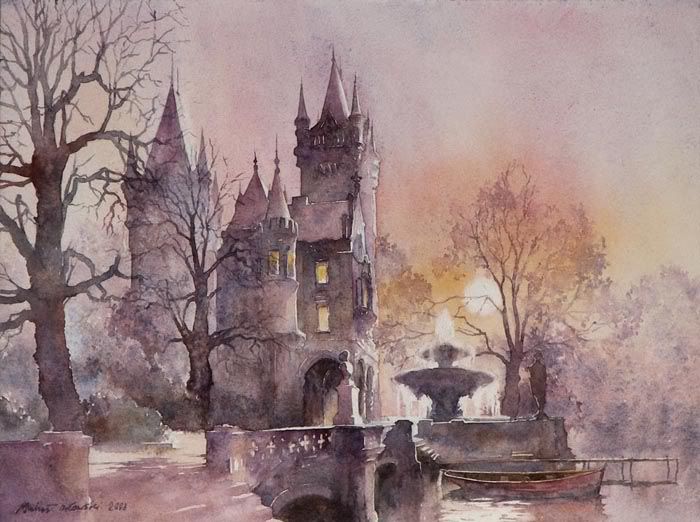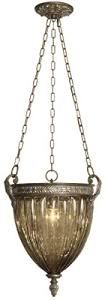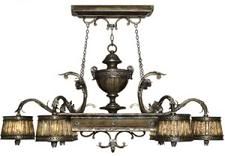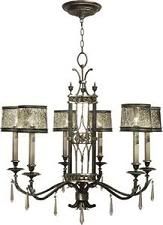
Johannes Brahms's Symphony no. 4 was the last he was to write, although he may not have known that; he was a little over 50 at the time -- an age older in his day than it seems now -- and he would live another dozen years. But his Fourth seems to me different in spirit, not only than any of his earlier orchestral compositions, but nearly unique even in the whole late-Romantic era. He perceived, and shaped in music, light from a distant star as yet undiscovered, possibly not even by himself.
Success had come relatively early to Brahms, deservedly so, but it was a mixed blessing. The public could not help designating him Beethoven's heir, and neither could he avoid feeling the responsibility. He long delayed writing a symphony after he had mastered other genres. When his First was eventually birthed, it was worthy of the preceding master. But while it's a great piece, the Brahms First often seems to be channeling Beethoven, and the big theme in the final movement openly mimics that of the Beethoven Ninth.
I haven't listened to no. 2 in a while; my recollection, always subject to revision, is that it embodies Brahms's melodic gift but is rather unwieldy (his longest symphony by a stretch). No. 3 has never really caught on and is infrequently programmed in concerts, but I like it.
Doing a little research, I was surprised to learn that scarcely two years had elapsed between Three and Four, the latter premiered in 1885. His soul seems to have shifted in between them. No doubt he still honored Beethoven, but Brahms was now his own man.
I am not a musician and can give you no musicological explanation of the Brahms Fourth, only an impressionistic glimpse.
Something about the Fourth is outside its own time. Much of it seems to recollect a mystical, imaginary Teutonic past, haunting, a little disturbing. It carries a tinge of Wordsworth's lass described in "The Solitary Reaper," singing to herself -- perhaps -- of "old unhappy far-off things, / And battles long ago."
The first movement begins with a gently rocking, wistful string melody. Later a counter-idea is introduced, a fanfare first heard in the brass, handed off to the strings and vice-versa. The original melody reappears in various liveries, though the second subject eventually dominates but never quite triumphs, hinting a secret sadness.
This seems to me the most "Slavic" orchestral music Brahms ever wrote, resembling Dvořák more than a little.
The second movement, marked andante moderato -- which I interpret as meaning slow enough to contrast with the opener, but not draggy -- is where the time-slip into a mythical world is most suggested. A conductor who miscalculates the tempo here blows the whole symphony.
A futile horn call, failing to wake the dead, leads off. It is answered by what sounds like clarinet and bassoon (sounds like -- I could be mistaken), and low strings take up a deliberate gait. An instrumental dialogue follows, mysterious and sensuous, not unlike the mood of the Allegretto of Beethoven's Seventh. The original theme takes on an air of classic Viennese charm, but just as you are getting comfortable with that, a shadow falls, the tone turns urgent. The score works up to moments of stirring passion, subsides in a soft melancholy.
Brahms undoubtedly felt that listeners needed a change-up afterward. The third movement is lively, the only part of the symphony that I hear as what we in our post-Jungian age would call extroverted. It's exciting, lovingly sculpted, a little conventional (for Brahms), but with a surprising punctuation: rhythmic points accentuated by a triangle. I could be ignorant, but I can't think offhand of any other Brahms symphony where that unusual percussion instrument comes into play.
The notes of the finale seem to be scattered by the winds. Brahms's music is often described as "autumnal," but here we seem to be post-autumn, winter's chill starting to register in the bones. The calm of a half-forgotten summer descends, but is superseded by an Aeolian rush. The symphony ends, to my reckoning, in a frenzy of emotional ambiguity.
The program notes for one recording tell me that the Fourth was the last of his own compositions that Brahms heard performed in concert, in Vienna on March 7, 1897. He passed out of this life three weeks later, perhaps to better understand the mystery that he had set in sound.
Success had come relatively early to Brahms, deservedly so, but it was a mixed blessing. The public could not help designating him Beethoven's heir, and neither could he avoid feeling the responsibility. He long delayed writing a symphony after he had mastered other genres. When his First was eventually birthed, it was worthy of the preceding master. But while it's a great piece, the Brahms First often seems to be channeling Beethoven, and the big theme in the final movement openly mimics that of the Beethoven Ninth.
I haven't listened to no. 2 in a while; my recollection, always subject to revision, is that it embodies Brahms's melodic gift but is rather unwieldy (his longest symphony by a stretch). No. 3 has never really caught on and is infrequently programmed in concerts, but I like it.
Doing a little research, I was surprised to learn that scarcely two years had elapsed between Three and Four, the latter premiered in 1885. His soul seems to have shifted in between them. No doubt he still honored Beethoven, but Brahms was now his own man.
I am not a musician and can give you no musicological explanation of the Brahms Fourth, only an impressionistic glimpse.
Something about the Fourth is outside its own time. Much of it seems to recollect a mystical, imaginary Teutonic past, haunting, a little disturbing. It carries a tinge of Wordsworth's lass described in "The Solitary Reaper," singing to herself -- perhaps -- of "old unhappy far-off things, / And battles long ago."
The first movement begins with a gently rocking, wistful string melody. Later a counter-idea is introduced, a fanfare first heard in the brass, handed off to the strings and vice-versa. The original melody reappears in various liveries, though the second subject eventually dominates but never quite triumphs, hinting a secret sadness.
This seems to me the most "Slavic" orchestral music Brahms ever wrote, resembling Dvořák more than a little.
The second movement, marked andante moderato -- which I interpret as meaning slow enough to contrast with the opener, but not draggy -- is where the time-slip into a mythical world is most suggested. A conductor who miscalculates the tempo here blows the whole symphony.
A futile horn call, failing to wake the dead, leads off. It is answered by what sounds like clarinet and bassoon (sounds like -- I could be mistaken), and low strings take up a deliberate gait. An instrumental dialogue follows, mysterious and sensuous, not unlike the mood of the Allegretto of Beethoven's Seventh. The original theme takes on an air of classic Viennese charm, but just as you are getting comfortable with that, a shadow falls, the tone turns urgent. The score works up to moments of stirring passion, subsides in a soft melancholy.
Brahms undoubtedly felt that listeners needed a change-up afterward. The third movement is lively, the only part of the symphony that I hear as what we in our post-Jungian age would call extroverted. It's exciting, lovingly sculpted, a little conventional (for Brahms), but with a surprising punctuation: rhythmic points accentuated by a triangle. I could be ignorant, but I can't think offhand of any other Brahms symphony where that unusual percussion instrument comes into play.
The notes of the finale seem to be scattered by the winds. Brahms's music is often described as "autumnal," but here we seem to be post-autumn, winter's chill starting to register in the bones. The calm of a half-forgotten summer descends, but is superseded by an Aeolian rush. The symphony ends, to my reckoning, in a frenzy of emotional ambiguity.
The program notes for one recording tell me that the Fourth was the last of his own compositions that Brahms heard performed in concert, in Vienna on March 7, 1897. He passed out of this life three weeks later, perhaps to better understand the mystery that he had set in sound.






3 comments:
Brahms is my favorite composer; and his Fourth Symphony is my favorite of the symphonies (and second overall among his large-scale works... First Piano Concerto always steals my heart... but it's vulgar to rank thinks like that).
I agree that there is something in this piece, especially the first and fourth movements, that is other-worldly. The main themes of the first and fourth movements are deceptively simple, and also echo one another. Rhythmically simple, but tonally complex.
There is a searching quality in much of Brahms' music that makes me love him more. In fact, it is his technically inferiority to Beethoven that makes his music so lovely. You can almost feel him trying to discern the argument of the symphony through the mist of shifting chords. Of course, I know that's not how a symphony gets written... but he manages to convey and humble uncertainty in his music, even as it is occasionally punctuated by the most glorious resolutions, as in the end of the first movement of the Fourth Symphony.
Thanks for the entry and for the nice blog!
Hello Rick. Another Brahms fan here. The fourth is my favorite of his symphonies (though of course I like them all, and am also partial to the third). The third movement is, I think, the sunniest of his music that I've ever heard - bursting with the ebullience of early summer.
And I share Mr. Humphries regard for the first piano concerto, one of the most beautiful pieces ever written. Indeed, I consider Brahm's solo piano pieces to be the most sublime music ever written for that instrument (Sorry Frederic - you were good, but not as good as Johannes).
Thanks for the post, and for your very fine blog.
Martin B,
Roger that about the First Piano Concerto. I am keen on just about everything Brahms wrote, except I have trouble warming to his string quartets. They're not bad, just don't seem quite up to his exalted level.
Post a Comment